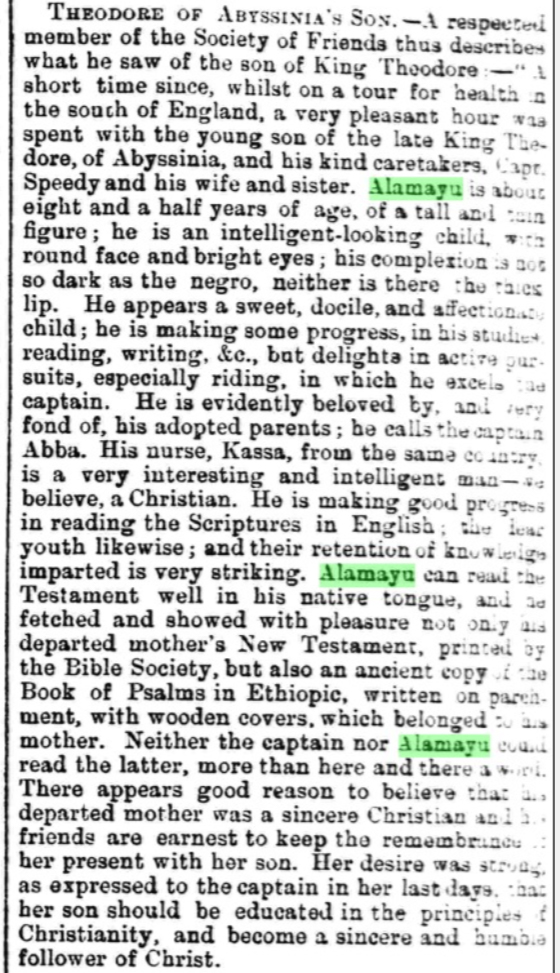What: A book of Psalms, belonged to Queen Tirunesh, the wife of King of Kings Tewodros II and mother of Prince Alamayu
Where: The British Museum, Great Russell St, Bloomsbury, London WC1B 3DG
Photo: There is no picture in the British Museum catalogue entry – https://www.britishmuseum.org/collection/object/E_Af1912-0410-37-b
With this book, a fable comes to life on a museum shelf. There was one story that everyone knew about Alamayu’s mother: the story about the time Tewodros interrupted her as she was reading the Bible’s Book of Psalms.
The queen turned to him coldly and told him to go away, saying she was conversing with a greater king than him. The story was repeated so often, and made its point so clearly, that it must have been a parable. But again, there it is, her actual copy of King David’s hymns and laments, in the British Museum.
Someone who visited Alamayu on the Isle of Wight described how the queen’s wood-covered Psalter was one of the boy’s most prized possessions. Here is the article in the Oct. 29, 1869 issue of The Star newspaper:

The British Museum doesn’t make a lot of the book. There’s no picture on its website and, like Alamayu’s necklace, it is not on display. That is hardly surprising. Ethiopian Books of Psalms are relatively common, one of the best-represented classes of sacred literature in collections of Ethiopic manuscripts. Most of them aren’t meant to be rarefied treasures. They are books for regular readings, daily devotions and prayers. Many, like this one, come with a leather carrying case and shoulder strap so people can lug them around with their baggage.
This one’s real value is in the story and in the details that must have reminded Alamayu of his mother – the small motifs next to the black and red text, the ‘square of red damask silk with floral designs in yellow and green’ set into the back. A small square mirror set in the inside cover would have caught the reflections of his mother’s face. It was not there for cosmetic reasons. Mirrors, which appear on a number of Ethiopian manuscripts, can be symbols of transcendence, of looking through something to something else or somewhere else.
‘It shows the importance of a prayer book,’ the Rev. Belete Assefa, a London-based priest from the Ethiopian Orthodox Tewahedo Church, told me. ‘It’s a reflection of the Kingdom of God, a reflection of heaven.’
Details:
The British Museum catalogue entry reads: “Book of Psalms previously belonging to Emperor Tewodros II’s wife. The pages are made of vellum and the text is hand written in black and red ink with occasional decorative panels of floral motifs. The book is bound in red leather covered wooden boards. The front and back covers are finely tooled with borders of diamonds, circles and interlacing designs. A central panel contains a finely tooled hand cross inlaid with five metal (?) studs at the base and and eighteen silver (?) studs around the cross. The inside front cover of tooled red leather is inlaid with a small square mirror with a border of silver (?) decorated with punched designs. The back inside cover of tooled red leather is inset with a square of red damask silk with floral designs in yellow and green with some metalic threads.”
Museum number: Af1912,0410.37.
Acquisition name: Donated by: Mrs Cornelia Mary Speedy
Field Collection by: Capt Tristram C S Speedy
Acquisition date: 1912
